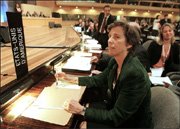
Read the full text of Ambassador Olivers address to UNESCO's Executive Board of October 3, 2006.
Excerpts from her address to the Board:
Mr. Director General, we do want to work with you, because we know how difficult it is to transform an intergovernmental organization like UNESCO into a revitalized, results-oriented institution. In order to be successful in this monumental task, we must all work together, with courage and persistence, as there are many pitfalls along the way that can derail the process of reform. This challenge is not for the faint-hearted, but fortunately we know that you, Mr. Director General, understand that despite all obstacles, UNESCO must continue to go down the path of reform if it is to become a more effective, influential, and respected member of the UN family.
In fact, since our return to UNESCO three years ago, the United States has observed that real progress has been made in a number of areas.........
Given the inherent interrelationship between good management and good results, the United States is pleased that a comprehensive management audit will be conducted of the World Heritage Center. This information will be of great help in developing an effective results-based management plan for the World Heritage program.
The Science Review Panel is another good initiative that will help us identify the appropriate niche for UNESCO in the area of science. Every year countries invest hundreds of billions of dollars in scientific research and development, including approximately $285 billion by the United States, the largest amount in the world. Obviously UNESCO cannot and should not try to compete in this area.
There are a number of areas, however, in which it is particularly well positioned to make a difference, such as fostering partnerships between developed countries and the developing world, and facilitating human and institutional capacity building. It can also support multilateral scientific initiatives, such as the SESAME program, the expansion of the IOC’s tsunami warning system, and various IHP water-related initiatives.
The United States is convinced that the Review Panel can help us strengthen the role of science at UNESCO, and we intend to take their recommendations seriously.
In both the public and private sectors, successful organizations constantly search for better and more cost-effective ways to conduct their business. In our view, the biggest challenge facing UNESCO is not the lack of resources, but the continued need for significant management and administrative reform. More funds for ineffective programs will simply produce more ineffective programs, and that will not help those countries and individuals that really need and deserve our assistance.
As we have said numerous times, UNESCO must focus on its priorities, and take full advantage of its multi-disciplinary organizational structure. Current programs should be evaluated to see if they are relevant and effective, and new initiatives supported only when it is clear that they are essential for the work of the organization. Furthermore, any new program should include a sunset clause that will automatically lead to the termination of that program unless there is a persuasive reason to have it renewed.
No comments:
Post a Comment